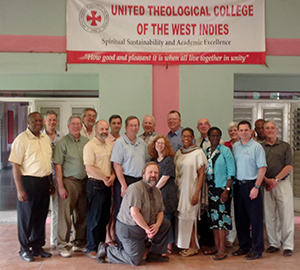By Bob Allen
Baptists remain convinced that baptizing believers upon their profession of faith is the pattern most clearly attested to in Scripture and a guide for those seeking to practice “New Testament Christianity,” according to a presentation at a recent ecumenical consultation on believers’ baptism. But they face a problem concerning the relationship between baptism and church membership.
Neville Callam, general secretary of the Baptist World Alliance, cited instances of “apparent indiscriminate baptism” as well as “the practice of admitting unbaptized persons into church membership” as challenges to a Baptist understanding of the ordinance of baptism in a presentation to the Global Christian Forum at the Consultation on Believers’ Baptism, held Jan. 10 in Kingston, Jamaica.
 The idea for the consultation emerged from the 2012 annual meeting of Secretaries of Christian World Communions — a gathering of leaders from diverse Christian traditions to discuss their work and fellowship together through ecumenical bodies such as the World Council of Churches — for a separate discussion among the six groups that share a common commitment to believers’ baptism.
The idea for the consultation emerged from the 2012 annual meeting of Secretaries of Christian World Communions — a gathering of leaders from diverse Christian traditions to discuss their work and fellowship together through ecumenical bodies such as the World Council of Churches — for a separate discussion among the six groups that share a common commitment to believers’ baptism.
The traditions represented were Baptists, Brethren, Churches of Christ, Disciples of Christ, Mennonites and Pentecostals, including Church of God. Joining Callam in representing the Baptist World Alliance were Glenroy Lalor, a lecturer at United Theological College of the West Indies, and Jim Somerville, pastor of First Baptist Church in Richmond, Va.
Participants agreed on affirmations including that “believers’ baptism is the most clearly attested pattern for baptism in the New Testament,” yet acknowledged “the growing acceptance, among some of our traditions, within the process of Christian initiation of a place for infant baptism.”
They recognized “the challenge to believer-baptist churches to find ways of affirming the importance of children in the life of the church” and affirmed “the diversity of the meaning and mode that exists between and even within traditions who are practitioners of believers’ baptism.”
They further affirmed “the importance of acknowledging that baptism is into Christ and his body, the Church, as well as into a particular congregation and church tradition.”
Among Baptists, Callam noted an “extreme form of open membership” practiced by some, which is based partly on the idea that baptism does not have instrumental value.
